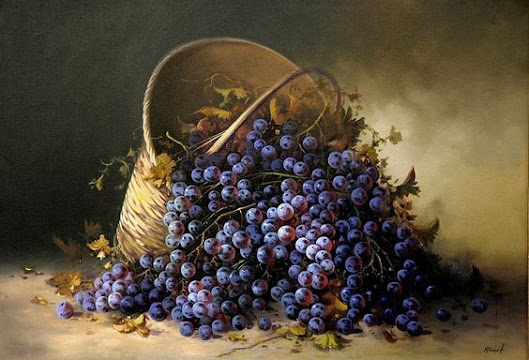Sri Narada Bhakthisuthram – Pradhamodhyaya: || 71 - 84
Chapter – 6 – Sri Narada Bhakthisuthram
The Pithrus becomes extremely happy, and
the deities dances in ecstasy, and the
Mother Earth flourishes with the rich natural resources and minerals when the
Jeeva achieves the Paramapremaswaroopa Bhakti, and this Jeeva performs the
all the deeds for the welfare of the Universe and its living beings. The caste, creed, status, Vidhya, beauty, the prominence of the clan, wealth, and occupation does not create any hindrance to
achieve the Paramapremaswaroopa Bhakti. The outward appearance of the Jeeva
does not make any obstruction to achieve the Bhakti, because of nature
all-pervasive Bhrmam resides as a soul in living beings. The person who has
achieved that Paramapremaswaroopa Bhakti should not be a topic of Vadha or
Prathivadha, each and every moment in the life of the Bhakta is precious,
which should be utilized only for the practice of Eshwaraprapthi and Sadhana. The
Vadha and Prathivadha stir anger, and hatred, eventually it would push the
Jeeva into misery and grief. Bhakti
cannot be defined in words, it is beyond expression, it is an experience,
therefore several noble souls have described Bhakti according to their
experience, it cannot be criticized or questioned, every individual has a different experience of that Paramapremaswaroopa Bhakti, and therefore Bhakti
is not a topic to debate. Sadhaka should be engaged in reading and listening to
those Bhakthishasthra which would enhance the devotion, remove impurities; it
multiplies serenity of mind and provides the knowledge of that all-pervasive
supreme Bhramam. The reading and listening to the scriptures would enhance the
Bhakti and Gnana, and purifies the intellect. The noble souls abandon Sukha
Dhukha, Labha, and Nashta, while waiting to breathe last, do not waste their
time, they contemplate upon that supreme Bhramam resides as a soul. The Paramapremaswaroopa Bhakti can be
achieved only through the practice of Ahimsa/non-violence, Sathyam/truthfulness,
Shaucham/purity, Dhaya/kindness, Asthikya/belief and faith in the Supreme Lord,
and strict following of disciplines and moral values. The Bhaktas has nothing
to get anxious about, they constantly engage in the contemplation of the
all-pervasive supreme Bhramam. The Parabhakthi/ananyabhakthi provides Eshwarasakshathkara/
achieves the grace of the supreme Lord instantly. The practice of Para bhakti/Ananyabhakthi is considered as the supreme tool to achieve the grace of the Supreme Lord, it is detailed as 1) interest in listening and reciting
and reading the marvelous legends and virtues of supreme Lord 2) interest in
the worship of Lord 3) interest in the contemplation on the virtues and myths
of Lord 4) interest in the service to Lord/Dhasya 5) Interest in the worship of
Lord as a constant companion 6) Interest in the veneration of the Lord as
child/Vathsalya 7) interest in the worship of Lord as a Priyathama/lover 8) worship
of Lord with Athmanivedhanam/complete surrender, 9) Interest in the worship of
Lord to achieve union with him 10) worship of Lord with the extreme anguish of
separation from him 11) worship of Lord witnessing the loveliness in him. The illustrious Rishis and Sages who are
prominent Bhakthiacharya, Sanathkumaras, Shandilya, Vyasa, Shuka, Garga,
Vishnu, Kaudinya, Shesha, Udhdhava, Aruni, Bali, Hanuman, and Vibheeshana have
strongly recommend the idea of Maharishi Narada.
Whoever reads or listens to the
auspicious Shastra composed by Maharishi Narada, with intense devotion and
faith would achieve that Paramapremaswaroopa Bhakti, ultimately achieve the
union with the supreme Bhramam.
Modhanthe Pitharo
Nrithyanthi Devatha: Sanadha Cheyam Bhur
Bhavathi ||
Nasthi Theshu Jathi Vidhya Roopa
Kula Dhana Kriyadhi Bhedha: ||
Yathasthadheeya: ||
Vadho Navalambhya: ||
Bahulyavakashathvadh Aniyathaththvaccha ||
Bhakthi Shasthrani Mananeeyani Thadhudh Bhodhaka Karmani
Karaniyani ||
Sukha Dhukeccha Labhadhi Thyakthe
Pratheekshyamane Kshanardhamapi
Vyarththam Na Neyam ||
Ahimsa Sathya Shaucha Dhayasthikhyadhi Charithryani
Paripalaneeyani ||
Sarvadha Sarvabhavena
Nishchinthai: Bhagavaneva
Bhajaneeya: ||
Sa Keerthyamana: Sheeghramevavir Bhavathyanu Bhavayathi Bhakthan
||
Thri Sathyasya Bhakthireva Gareeyasi Bhakthireva Gareeyasi ||
Guna Mahathmayasakthi Rooopasakthi Poojasakthi Smaranasakthi
Dhasyasakthi Sakhyasakthi Vathsalyasakthi Kanthasakthi Athmanivedhanasakthi
Thanmayathasakthi Paramavirahasakthi Roopa Yekadha Api Yekadhashadha Bhavathi ||
Ithyevam Vadhanthi Jana Jalpa Nirbhaya: Yekamatha: Kumara Vyasa
Shuka Shandilya Garga Vishnu
Kaundinya Shoshadhdhavaruni Bali
Hanumath Vibheeshanadhayo Bhakthyacharya: ||
Ya Idham Narada Proktham Shivanushasanam Vishvasithi Shradhdhaththe Sa Bhakthiman Bhavathi Sa: Preshtam
Labathe Sa: Preshtam Labhatha Ithi ||
||Ithi Narada Bhakthisuthram Sampoornnam ||
